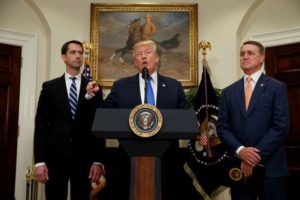Donald John Trump promised to “put America first.” He also pledged to change U.S. immigration policy, to make it more selective.
I want to share with you a poem that appears on the pedestal at the foot of the Statue of Liberty.
“Not like the brazen giant of Greek fame,
With conquering limbs astride from land to land;
Here at our sea-washed, sunset gates shall stand
A mighty woman with a torch, whose flame
Is the imprisoned lightning, and her name
MOTHER OF EXILES. From her beacon-hand
Glows world-wide welcome; her mild eyes command
The air-bridged harbor that twin cities frame.
“Keep, ancient lands, your storied pomp!” cries she
With silent lips. “Give me your tired, your poor,
Your huddled masses yearning to breathe free,
The wretched refuse of your teeming shore.
Send these, the homeless, tempest-tost to me,
I lift my lamp beside the golden door!”
It’s the “New Colossus,” written by Emma Lazarus. It has served as a guidepost for those seeking entrance into the Land of Opportunity.
Donald Trump wants to water it down. He is proposing a policy that limits entrance only to those with skills that can be put to good use.
You know already that I am the grandson of immigrants. They came here near the turn of the 20th century. They hailed from southeastern Europe. They weren’t particularly “skilled,” nor did they possess a lot of formal education. But they came here to forge a new life. They succeeded magnificently.
The president wants to give preference to those who can speak English. Hmmm. Only one of my grandparents had any English skills upon arrival. The rest of them, I guess, were likely to be denied.
I don’t want this proposal to become law. It is an affront to what we have stood for — as a nation of immigrants.
Putting “America first” means, in my mind, honoring all of those who choose to come here in search of a better life. If they find it in the United States of America, then they have enriched not only themselves and their families, but also the nation they call “home.”
